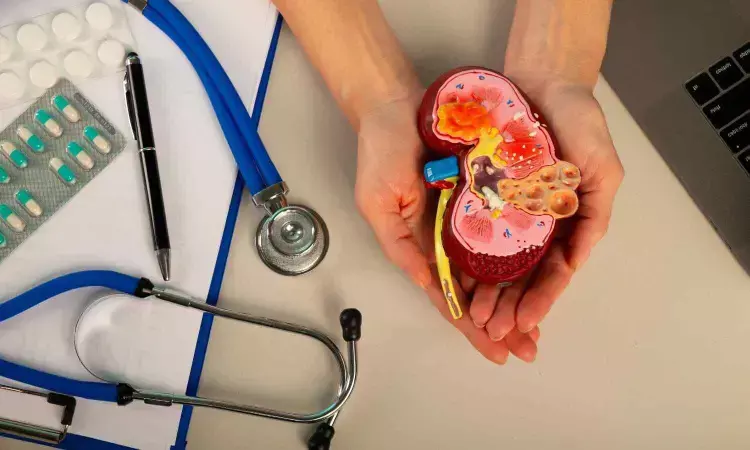- Home
- Medical news & Guidelines
- Anesthesiology
- Cardiology and CTVS
- Critical Care
- Dentistry
- Dermatology
- Diabetes and Endocrinology
- ENT
- Gastroenterology
- Medicine
- Nephrology
- Neurology
- Obstretics-Gynaecology
- Oncology
- Ophthalmology
- Orthopaedics
- Pediatrics-Neonatology
- Psychiatry
- Pulmonology
- Radiology
- Surgery
- Urology
- Laboratory Medicine
- Diet
- Nursing
- Paramedical
- Physiotherapy
- Health news
- Fact Check
- Bone Health Fact Check
- Brain Health Fact Check
- Cancer Related Fact Check
- Child Care Fact Check
- Dental and oral health fact check
- Diabetes and metabolic health fact check
- Diet and Nutrition Fact Check
- Eye and ENT Care Fact Check
- Fitness fact check
- Gut health fact check
- Heart health fact check
- Kidney health fact check
- Medical education fact check
- Men's health fact check
- Respiratory fact check
- Skin and hair care fact check
- Vaccine and Immunization fact check
- Women's health fact check
- AYUSH
- State News
- Andaman and Nicobar Islands
- Andhra Pradesh
- Arunachal Pradesh
- Assam
- Bihar
- Chandigarh
- Chattisgarh
- Dadra and Nagar Haveli
- Daman and Diu
- Delhi
- Goa
- Gujarat
- Haryana
- Himachal Pradesh
- Jammu & Kashmir
- Jharkhand
- Karnataka
- Kerala
- Ladakh
- Lakshadweep
- Madhya Pradesh
- Maharashtra
- Manipur
- Meghalaya
- Mizoram
- Nagaland
- Odisha
- Puducherry
- Punjab
- Rajasthan
- Sikkim
- Tamil Nadu
- Telangana
- Tripura
- Uttar Pradesh
- Uttrakhand
- West Bengal
- Medical Education
- Industry
Early Preemptive Kidney Transplants fail to Lower Mortality Risk in ESKD: Study

A new study published in the journal of Transplantation Proceedings showed that in individuals with end-stage kidney disease (ESKD), early preventive kidney transplants do not lower the chance of death.
Among other things, diabetes and high blood pressure can lead to end-stage kidney disease, sometimes referred to as renal or kidney failure. When starting dialysis, or even before, a patient with kidney failure needs a transplant. It is widely accepted that people with ESKD would fare better if they received a kidney transplant beforehand, before beginning dialysis, because dialysis strains the body and impairs immunity. With an emphasis on the mortality benefit of early preemptive transplants, Abhishek Kumar and colleagues therefore carried out this study to assess the present status of preemptive kidney transplants in the United States.
This research investigated patterns in preemptive kidney transplantation among first-time adult patients using the United Network of Organ Sharing database. Based on the estimated glomerular filtration rate [eGFR] at the time of transplant, they divided the population into 4 groups: ≥ 20 mL/min/1.73 m2, 10 to < 15 mL/min/1.73 m2, 15 to < 20 mL/min/1.73 m2, and < 10 mL/min/1.73 m2. The risk of ESKD was compared between the groups using the cumulative incidence competing risk (CICR) approach, and the difference in mortality was evaluated using multivariable Cox regression.
About 18% of all kidney transplants are still preventive (33% from dead donors and 67% from current donors). Preemptive kidney transplants were more likely to be given to white individuals with private insurance and greater educational attainment. The four eGFR groups did not vary in terms of mortality. Again, there was no difference in mortality between the four groups in a subgroup analysis that focused solely on recipients of preemptive kidney transplants from live donors.
Overall, the findings of study shows that even though the "Kidney First Initiative" was started more than ten years ago, the rates of preventive kidney transplants have been clinically unchanged over the past 20 years. 24% of recipients of preemptive LDKTs, where the transplant date can be somewhat controlled, have an eGFR ≥ 15 mL/min/1.73 m2, which is overly early given that there was no survival advantage and that patients were exposed to the dangers of immunosuppression and lifestyle changes.
Reference:
Kumar, A., Bonnell, L., & Kuppachi, S. (2025). Early pre-emptive kidney transplant does not offer any mortality benefits: A study of trends in pre-emptive kidney transplantation over the last two decades. Transplantation Proceedings, 57(4), 538–543. https://doi.org/10.1016/j.transproceed.2025.02.032
Neuroscience Masters graduate
Jacinthlyn Sylvia, a Neuroscience Master's graduate from Chennai has worked extensively in deciphering the neurobiology of cognition and motor control in aging. She also has spread-out exposure to Neurosurgery from her Bachelor’s. She is currently involved in active Neuro-Oncology research. She is an upcoming neuroscientist with a fiery passion for writing. Her news cover at Medical Dialogues feature recent discoveries and updates from the healthcare and biomedical research fields. She can be reached at editorial@medicaldialogues.in
Dr Kamal Kant Kohli-MBBS, DTCD- a chest specialist with more than 30 years of practice and a flair for writing clinical articles, Dr Kamal Kant Kohli joined Medical Dialogues as a Chief Editor of Medical News. Besides writing articles, as an editor, he proofreads and verifies all the medical content published on Medical Dialogues including those coming from journals, studies,medical conferences,guidelines etc. Email: drkohli@medicaldialogues.in. Contact no. 011-43720751


